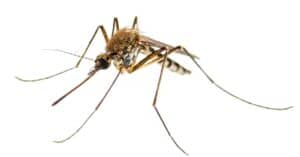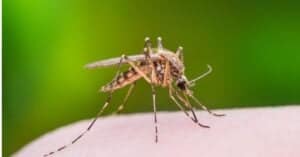It’s almost here – the end of mosquito season! Thankfully, we don’t have to wait long before they are gone, but there are still a lot of questions surrounding these pesky little insects. When do they get here, when do they leave, and why are they so annoying? These are among the most common, and we are going to answer them today. Let’s get started and discover: When do mosquitoes go away? The answer depends on where you live!
When Do Mosquitoes Go Away? A Regional Guide
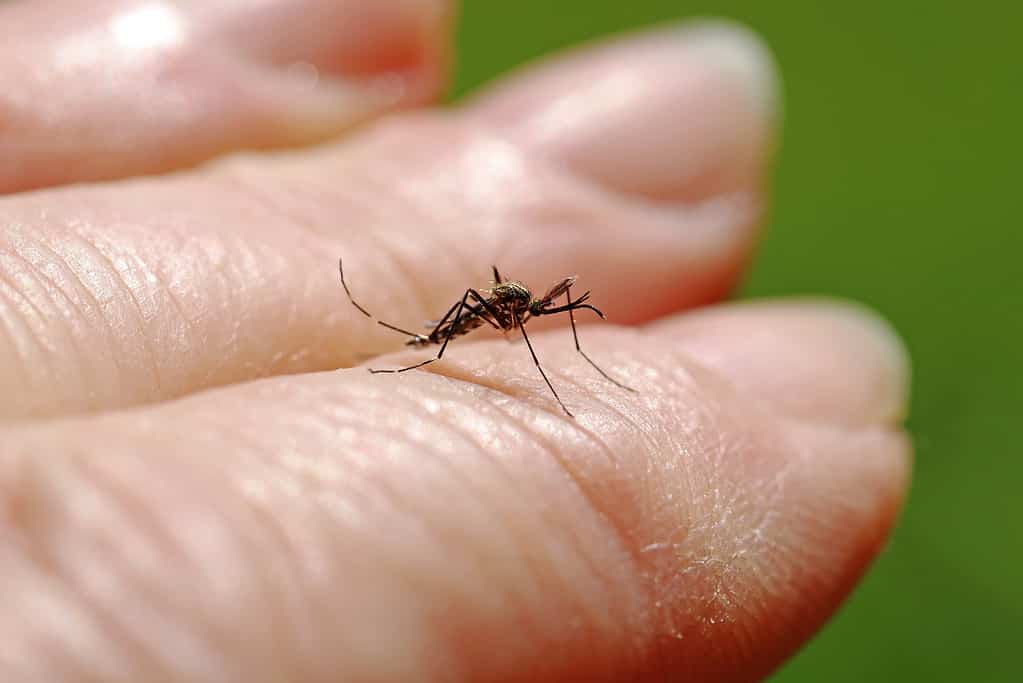
Mosquitos are found all over the U.S. but leave for the winter according to the weather and the region.
©Astrid860/ via Getty Images
Mosquitoes are annoying pests that can ruin your outdoor activities and, although rare in the U.S., expose you to some diseases! But when do mosquitoes go away? Ultimately, the answer depends on where you live and the climate of your region. Here’s a regional guide to help you determine if you are near the end of your suffering.
| Region | States | Season Length |
|---|---|---|
| Gulf Coast, Florida, and Hawaii | N/A | February – November |
| South and Southwest | CA, AZ, NM, TX, LA, MS, AL, GA, TN, SC, NC | March – September |
| Mid-Atlantic, Midwest, and West | CA, NV, UT, CO, NE, KS, MO, KY, IL, OH, WV, VA, MD, PA | April – September |
| New England, Northern Midwest, and Pacific Northwest | WA, MT, ND, SD, MN, WI, MI, NY, MA, VT, NH, ME | May – September |
Gulf Coast, Florida, and Hawaii
Mosquito season: February – November
If you live in the Gulf Coast, Florida, or Hawaii, you probably have to deal with mosquitoes for most of the year. These regions have warm, (extremely) humid, and wet climates that are the perfect places for mosquito breeding and nearly year-round survival. Mosquitoes can be active even in the winter months, especially in areas near water sources, although some cooler areas can see a decrease during the peaks of winter.
South and Southwest
Mosquito season: March – September
The South and Southwest regions of the United States also experience long mosquito seasons due to their warm temperatures. These regions include southern California, Arizona, New Mexico, northern Texas, Louisiana, Mississippi, Alabama, Georgia, Tennessee, South Carolina, and parts of North Carolina (most specifically in the southern coastal plains). Mosquito season usually begins in March and lasts until September, but it can vary depending on the weather. Some areas may have year-round mosquito activity if there’s a lot of standing water, especially near swamps and lowlands.
Mid-Atlantic, Midwest, and West
Mosquito season: April – September
The Mid-Atlantic, Midwest, and Western regions of the United States have (somewhat) milder climates that are not as ideal for mosquitos during the winter. These regions include California, Nevada, Utah, Colorado, Nebraska, Kansas, Missouri, Kentucky, Illinois, Ohio, West Virginia, Virginia, Maryland and Pennsylvania. In these states, the season typically starts in April and ends in September, but it can be shorter or longer depending on the weather conditions.
New England, Northern Midwest, and Pacific Northwest
Mosquito season: May – September
The New England, Northern Midwest, and Pacific Northwest regions of the United States have the shortest mosquito seasons in the country. These regions have cooler temperatures that limit mosquito activity. These regions include Washington, Montana, North Dakota, South Dakota, Minnesota, Wisconsin, Michigan, New York, Massachusetts, Vermont, New Hampshire and Maine. Mosquito season usually begins in May and ends in September, but it can be affected by plenty of weather events like rain or even snowmelt that create conditions for breeding.
How to Prepare for Mosquito Season
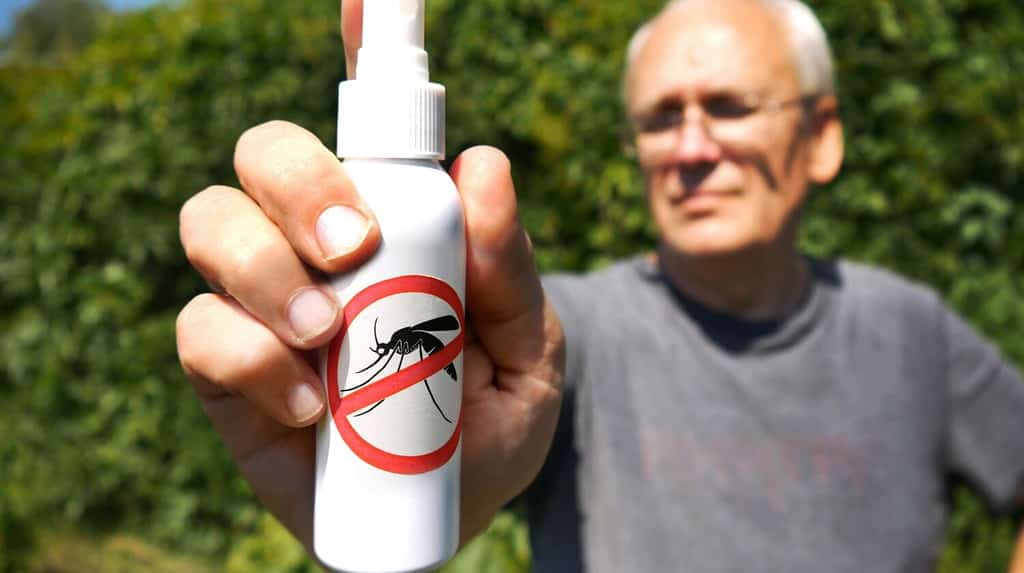
Chemical sprays and lotions that contain things like DEET have been shown to be the most effective for mosquito repellent.
©Stockah/Shutterstock.com
If you live in certain areas of the country, it’s almost a certainty that you will encounter a buzzy friend during the season. Still, there are ways to reduce your contact with them and at least save yourself an evening of itching:
- Dump any standing water around your home and yard. Mosquitoes breed in stagnant water sources such as birdbaths, buckets, planters, tires, or anything with a bowl shape.
- Use repellents when you go outside. Nowadays, there are all sorts of products with different ingredients, including DEET, picaridin, or eucalyptus. Be aware that bracelets aren’t as effective as standard sprays or lotions.
- Wear specialty clothing when possible. Long sleeves and shirts will usually stop insects, but some outdoor clothing companies also treat their clothing with permethrin or something similar.
- Install screens on your windows and doors. A mosquito in the house can be a nightmare. Screens help a lot. You can also use fans or air conditioners to create air currents that a mosquito can’t fly in.
- Avoid peak mosquito hours. Mosquitoes are most active during dawn and dusk when the temperature is cooler and the humidity higher.
Where Do Mosquitoes Go During the Winter?
Mosquitoes are cold-blooded insects that cannot survive freezing temperatures. However, they have different strategies to cope with the winter depending on their species and life stage. Most of the time, the males die out and don’t make it through the winter. Females can make it through the winter by overwintering in water sources that do not freeze completely or by laying eggs in moist earth.
- Hibernation/Diapause: Some adult mosquitoes, especially females, enter a unique state of dormancy called “diapause”. They will look for a sheltered place like a log to hibernate until the spring.
- Migration: Males don’t really go into the hibernation state but will instead fly to warmer regions where they can continue to breed and feed. Otherwise, the males will just die out when the season changes.
- Overwintering: Immature mosquitoes like eggs, larvae, or pupae “overwinter” in water sources that don’t totally freeze. In a pretty remarkable act of nature, they can withstand low temperatures by producing special antifreeze proteins to prevent tissue damage. When it warms up again, they hatch!
Why Do Mosquito Bites Itch?
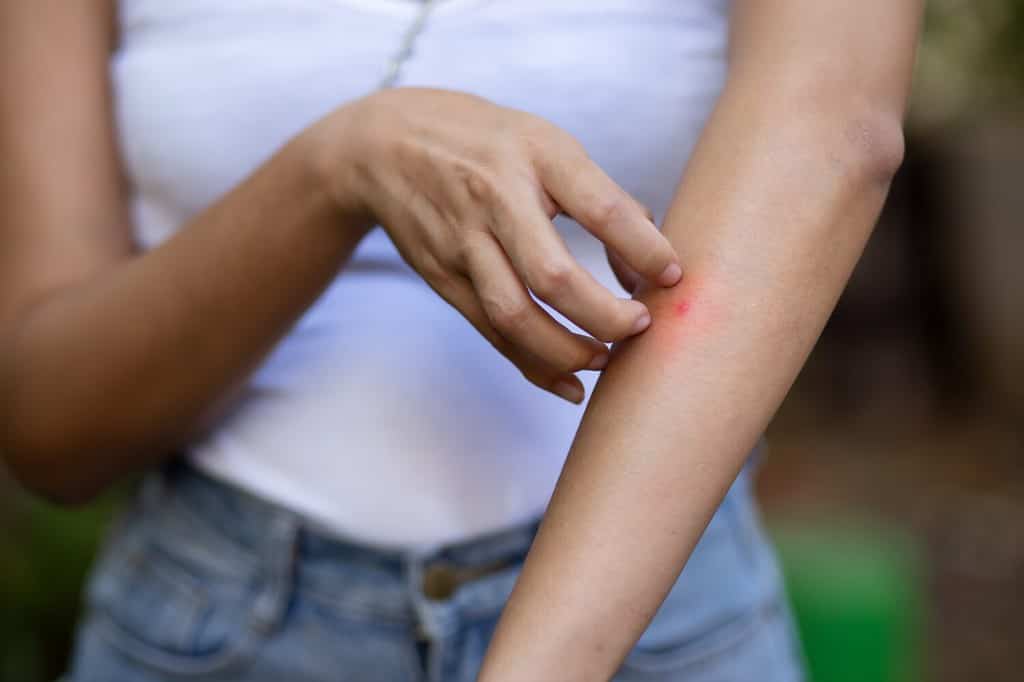
Pretty much everyone has had a mosquito bite! They are an allergic reaction to the saliva sent into the body when a female starts to suck blood.
©9nong/Shutterstock.com
At the core of it, mosquito bites are just an allergic reaction to a mosquito’s saliva. Essentially, your body is trying to fight off mosquito spit!
When a female mosquito bites you, she injects some of her saliva into your skin (for a purpose). Her saliva contains proteins and anticoagulants that help her suck your blood without clotting. Otherwise, she couldn’t get a full meal. Soon after, however, the body senses substances are foreign and trigger an immune response. The typical immune response is inflation, itching, and swelling – viola, a mosquito bite!
The amount of histamine and the intensity of the itch can be extremely varied, depending on someone’s sensitivity to mosquito saliva. Some people may not react at all, while others may develop larger-than-average welts. On top of that, people who are repeatedly bit usually develop a bit of a tolerance for it and become less sensitive to the saliva overall.
Interestingly, the saliva mechanism is the exact reason that mosquitoes are so adept at spreading disease around the world:
- A female mosquito takes a blood meal from a human or animal host with bacteria or a virus.
- The germ then makes its way from the blood and infects the mosquito.
- The germ reproduces inside the mosquito’s body for a certain time, called the “extrinsic incubation period”.
- Then the germ infects the salivary glands of the mosquito.
- When the mosquito bites a human or animal host, it releases saliva into the host, sending the germ into them and potentially causing illness.
- If a healthy mosquito bites a sick human, the cycle repeats!
The photo featured at the top of this post is © RealityImages/Shutterstock.com
Thank you for reading! Have some feedback for us? Contact the AZ Animals editorial team.




